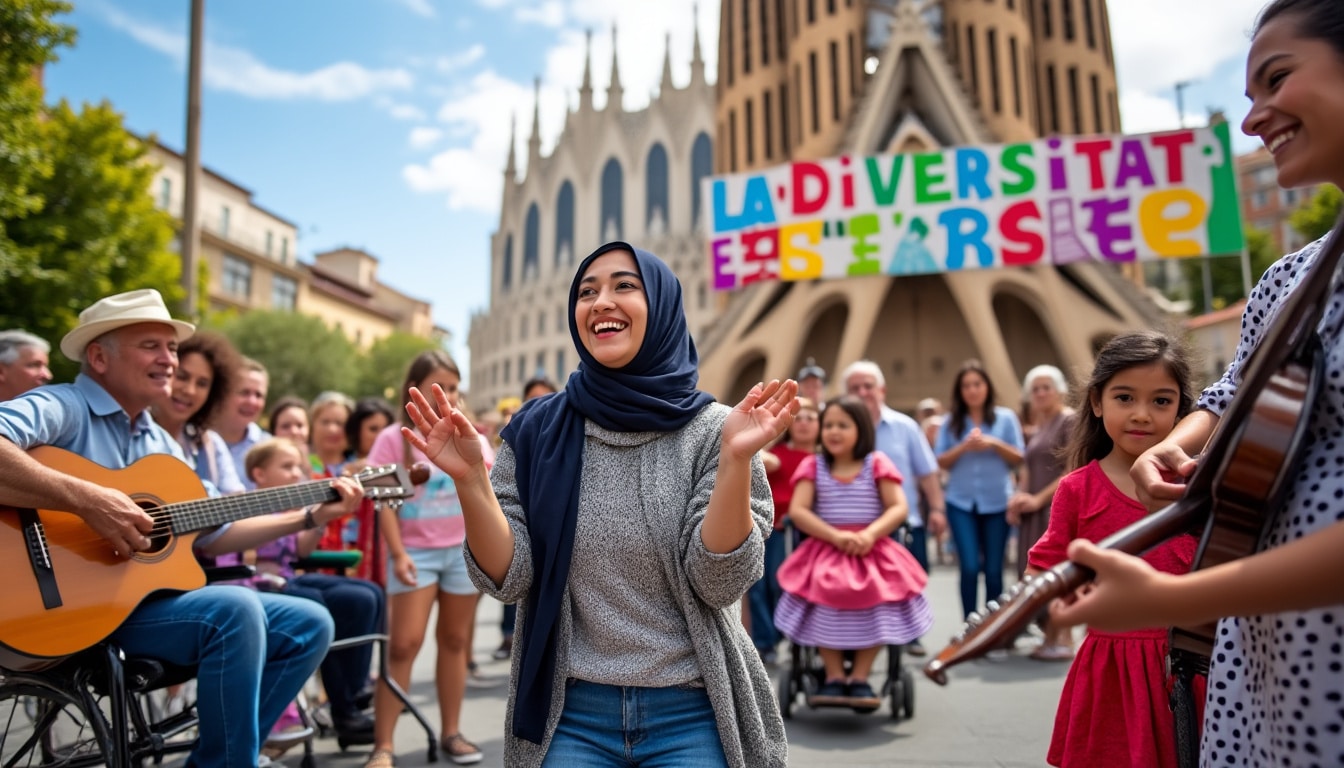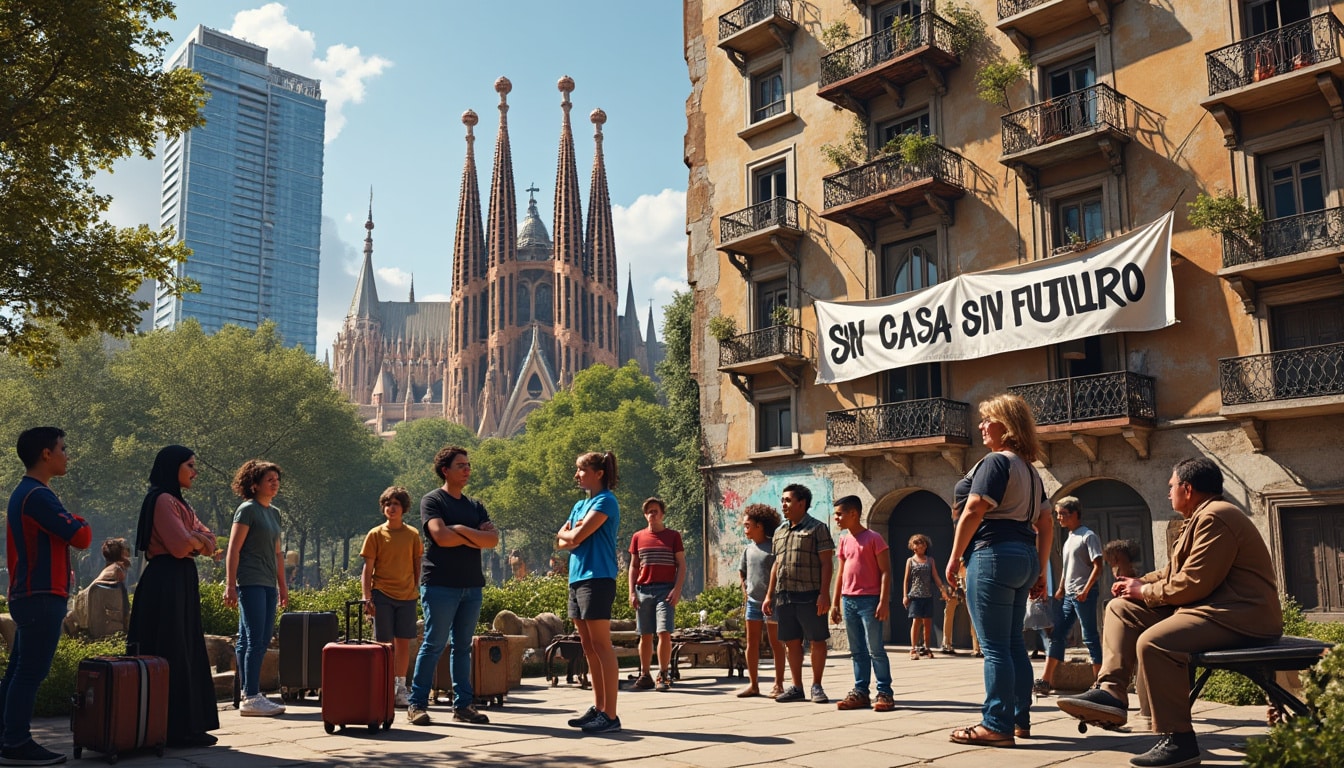Barcelona, a city renowned for its architectural marvels and rhythmic energy, faces significant social and discrimination challenges. Recent data reveals an increase in discriminatory incidents, highlighting a pressing need to address racism and ensure inclusivity. This vibrant metropolis, revered for its culture and diversity, now contends with the growing impact of xenophobia, LGBTI-phobia, and various forms of discrimination, including mental health discrimination and economic disparities.
Understanding the Rise of Discriminatory Incidents in Barcelona
The year 2023 marked a significant uptick in discrimination cases within Barcelona, pointing towards deep-seated societal issues. According to reports from the city’s Discrimination Observatory, a remarkable 865 discrimination cases were documented, a 37% surge compared to the preceding year. As the Catalan jewel struggles with these burgeoning challenges, the city remains financially committed to combating this social malaise and promoting civic harmony.
The most prominent contributors to discrimination remain deeply rooted in historical prejudices. Racism and xenophobia emerged once again as the leading causes, accounting for 185 of the reported cases, dwarfing other categories. This prevailing dynamic raises pivotal questions about underlying biases that persist despite societal advancements and the global movement towards equality. LGBTI-phobia followed closely with 129 incidents, with a concerning number of events involving verbal and physical assaults.
Health-related discrimination, particularly concerning mental health and HIV status, has alarmingly tripled, marking an escalation in societal stigmatization. Of the 120 reported health-related cases, the majority stem from systemic challenges within public institutions such as hospitals and courts. This trend highlights the urgent need for these establishments to embrace cultural competence and empathy as part of their operational ethos.
The Observatory’s latest report also reveals the continuation of other forms of discrimination in the city. A notable number of incidents cited language barriers (90 incidents), economic poverty or aporophobia (82 incidents), and disability (68 incidents) as discriminatory factors. Discrimination based on gender, religion, ideology, and age also adds layers to this complex issue.

As a hub for creative thinkers and catalysts of social change, Barcelona’s intricate social dynamics expose vulnerabilities that demand a proactive, inclusive approach towards cultivating mutual respect and understanding. Through embracing diversity and fostering open dialogue, the city’s path to equality and inclusivity is promising, albeit challenging.
The Impact of Racism and Xenophobia on Barcelona’s Social Fabric
Racism and xenophobia stubbornly persist, threatening the fabric of Barcelona’s vibrant tapestry. Within this bustling cityscape, these issues have become recurring themes in the headlines, triggering both local and international concern. The persistent climb in incidents demands an examination of both overt and covert discrimination to craft effective interventions.
Data from the Discrimination Observatory identifies racism and xenophobia as the primary discriminatory forces over the past five years. Reports illustrate that 185 cases involved racial or ethnic discrimination, underscoring an unsettling trend within local communities. As a cosmopolitan city with a diverse populace, the persistence of such attitudes is as disheartening as it is debilitating, affecting not only the victims but the city’s societal cohesion.
The local initiatives, such as Barcelona Activista and the Stop Discrimination BCN, actively campaign against racism by organizing workshops, cultural events, and awareness projects. These efforts endeavor to demonstrate that mere tolerance should transform into acceptance and appreciation of diversity, promoting intercultural dialogue.
It’s important to recognize the systemic nature of this problem. Economic disparities and access to public services often reflect these racial divides, further exacerbating inequalities. Public housing allocation, healthcare services, and employment opportunities are arenas where racial biases often manifest. The city’s collaboration with the Social Justice Alliance aims to dismantle these barriers by advocating for fair policies and practices that embrace equal opportunities for all.
Despite these challenges, the narrative is not entirely bleak. Engaging communities in open discussions has sparked both awareness and empathy. Barcelona’s resilience shines through its determination to pave a path towards justice and parity. The city’s commitment to addressing these core issues is essential not only for dismantling stereotypes but also for ensuring all residents can thrive equally in this dynamic city.
Challenges Faced by the LGBTI Community in a Transforming City
Barcelona has long been celebrated as a beacon of acceptance for the LGBTI community. The city’s vibrant Pride celebrations and robust community networks have historically championed LGBTI rights. Yet, recent reports signal a distressing plateau in progress, with incidents of LGBTI-phobia maintaining their prevalence in public and private spaces.
In 2023, 129 cases of LGBTI-phobia were reported, consistent with past figures. Alarmingly, 67% of these incidents occurred in public areas, highlighting the emboldened hostility faced by the community. Acts of verbal aggression, making up 33% of these cases, reveal an environment where derogatory remarks seem normalized to some.
Hostility toward the community extends to systemic challenges. Numerous LGBTI individuals encounter discrimination in healthcare settings, job markets, and housing. Volunteer organizations like Barcelona Voices and Inclusion BCN are pivotal in providing support networks, advocacy, and education to challenge biases and foster inclusivity.
Despite these daunting circumstances, there are harbingers of hope. Community-led initiatives strive to shift societal attitudes by engaging diverse groups in conversations around gender identity and expression. Workshops, mentorship programs, and inclusive policy-making aim to create a society that accepts, respects, and celebrates diversity. However, progress demands a collective effort that transcends beyond marches and hashtags.
Barcelona’s legacy as a welcoming city for LGBTI people faces a critical juncture. By championing sustainable change, the city can redefine its cultural landscape and evolve into a role model for inclusivity. The journey ahead requires courage, resilience, and unwavering dedication to social justice for all, irrespective of identity.
Health and Discrimination: A Growing Concern in Barcelona
Within Barcelona’s healthcare sphere, discrimination based on health conditions, particularly mental health and HIV status, has been sharply spotlighted. In 2023, these issues surged, marking a tripling of such reports. This escalation not only underscores societal biases but also points to institutional shortcomings in addressing diverse health needs.
The stark reality is an overwhelming 120 cases of discrimination related to health in just one year. The discrimination predominantly targeted mental health (70 cases) and HIV diagnoses (31 cases), highlighting a pervasive stigma that reverberates through healthcare systems. The consequence of such discrimination is severe, leading to delayed treatment, poor health outcomes, and profound mental distress for the victims.
Collective efforts led by groups like the Barcelona Human Rights Network and the Equal Opportunity Group actively promote awareness and advocate for change. Their initiatives strive to educate the public and dismantle the myths surrounding mental health and HIV, fostering environments where individuals receive equitable care devoid of judgment or bias.
The public administration sees a significant share of these discrimination cases. Incidents of covert or overt coercive practices in mental healthcare settings, such as involuntary admissions and verbal coercion, remain troublingly common. Private institutions also play a role, contributing to the persistence of exclusionary practices.
To counteract these issues, significant revamping of healthcare policies and attitudes is necessary. Training medical professionals in cultural competence and empathetic patient care is a critical step. The pursuit of an inclusive healthcare system in Barcelona not only aligns with ethical obligations but stands as a testament to the city’s commitment to social justice and equity.
Efforts Towards Inclusion and Equal Opportunities in Barcelona
As Barcelona grapples with social and discrimination issues, efforts are intensifying to build an inclusive society. The city’s vibrant history and cultural diversity offer a strong foundation upon which to foster inclusivity and champion equality.
Several key initiatives have risen to the forefront in this battle for social justice. Activist networks such as the Catalan Civil Rights and Diversity Matters are pivotal in driving legislative reform and promoting public awareness campaigns. These organizations advocate for laws that protect minority groups and ensure equal opportunities in various societal facets.
The city’s approach includes fostering dialogue through events that bring together diverse voices. Projects such as “Barcelona Dialogues” are platforms for exchange, where experiences and challenges are shared, dismantling barriers to understanding and empathy. Furthermore, Equality Now leads initiatives that engage with policy-makers to enshrine equality in law and practice.
Despite the commendable efforts, challenges persist. Economic disparities and the lack of affordable housing continue to hinder progress for many marginalized groups. Yet, the city’s determination is unwavering. By promoting community-driven projects and civic engagement, Barcelona strives to attain a society where diversity is celebrated, and equal opportunity is the standard.
| Issue | Cases in 2023 | Key Initiatives |
|---|---|---|
| Racism & Xenophobia | 185 | Barcelona Activista, Stop Discrimination BCN |
| LGBTI-phobia | 129 | Barcelona Voices, Inclusion BCN |
| Health Discrimination | 120 | Barcelona Human Rights Network, Equal Opportunity Group |
| Language Discrimination | 90 | Catalan Civil Rights |
As the city moves forward, these challenges remain formidable. Still, Barcelona’s rich cultural tapestry and its people’s resilience empower it to tackle these issues head-on. Through mutual commitment, collective action, and unwavering dedication towards equality, Barcelona can emerge as a beacon of hope in the global struggle for social justice.
FAQ
- What are the main causes of discrimination in Barcelona?
Racism and xenophobia are the leading causes, followed by LGBTI-phobia and health-related discrimination. - How is Barcelona addressing LGBTI-phobia?
Several initiatives like Barcelona Voices and Inclusion BCN are working to foster inclusivity and provide support to the LGBTI community. - What role does the Discrimination Observatory play?
The Discrimination Observatory tracks incidents, raises awareness, and supports policy-making to combat discrimination. - Are there support networks for discrimination victims in Barcelona?
Yes, organizations like the Office for Non-Discrimination provide support, advice, and advocacy services. - How can Barcelona improve health-related discrimination?
Through awareness campaigns, policy reform, and training healthcare providers in cultural competence.

